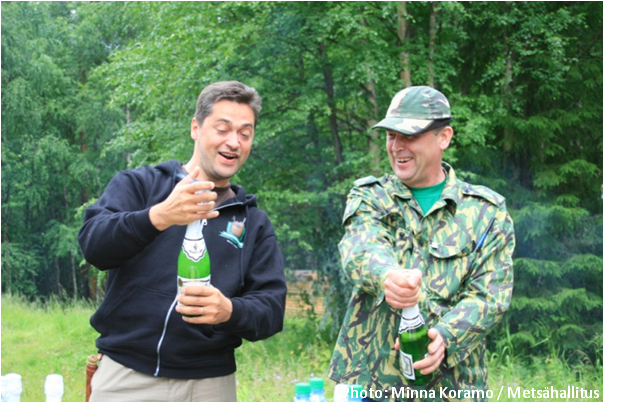Strengthening transboundary cooperation through joint action
Park Director Kari Lahti of Oulanka National Park and Park Director Aleksandr Bizhon of Paanajärvi National Park celebrating success of transboundary cooperation in Paanajärvi National Park in 2008
For transboundary cooperation to work, it is important that the transboundary National Parks work together on common tasks and activities. This can be achieved through joint implementation of projects. In the case of Oulanka National Park in Finland and Paanajärvi National Park in Russia, many projects have been implemented in order to solidify these two entities into one real functional unit – a twin park – that serves as a model for transboundary cooperation.
The Interreg/Tacis Joint Project “Oulanka-Paanajärvi – wilderness, experiences and well-being” contributed toward ensuring ecological and socio-economic sustainability of Oulanka and Paanajärvi National Parks while preserving and enhancing attractiveness of the region for visitors and to make the twin park the most important and attractive destination for nature-oriented tourism in the region. This in turn creates possibilities for entrepreneurship and preserves and strengthens employment opportunities for local people and entrepreneurs.
Joint management and implementation of the project was an important tool in making transboundary cooperation part of the daily work in the management of the transboundary National Parks on both sides of the border.
It is helpful if transboundary cooperation has recognition on a higher level than just the National Parks. In Oulanka-Paanajärvi twin park, in addition to the joint agreement of collaboration there is a convention between the Finnish and Russian governments as well as a memorandum between the regional governments. The commitment of twin park managers and personnel to reaching common goals and working together is essential. Promotion on both sides is important and helps nature tourism businesses in creating sustainable transboundary products.
The best way to make transboundary work part of daily activities of managers and personnel of the National Parks is to do actual work together and in such a way that all levels of personnel participate in the work. Transboundary work cannot be just meetings between higher level staff but actual hands-on work by all levels of personnel.
It is important that the staff members that have knowledge of the language spoken in the NP across the border or another common language actively act as interpreters in order to help communication between personnel in transboundary NPs. Language learning should be encouraged and supported by the management of NPs.
It is also important to celebrate the achievements together and invite local people, businesses, local and regional government and media to take part in the events. It is important to make new history together especially in Oulanka-Paanajärvi region where wars were fought and the border was closed for a long time.

